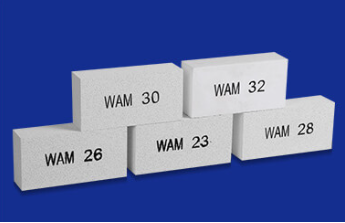The Best Solution For Energy Saving And Reducing CO2 Emission
The Best Solution For Energy Saving And Reducing CO2 Emission
 Tel: +86-532-85717690/85717352/85832089
Tel: +86-532-85717690/85717352/85832089 E-mail: wam@wamcn.net
E-mail: wam@wamcn.net
Whether you want to insulate a home or a commercial space, you need a reputable Insulating bricks supplier from which you can get durable bricks.
However, before choosing an insulating bricks supplier, you need to be familiar with the features, advantages, and uses of the Insulating bricks to know the type suitable for your need.
One of the most prevalent types of Insulating bricks is refractory brick, commonly known as fire brick. It is typically used in burners and kilns, which get quite hot. Bricks used for thermal insulation are commonly found in industrial heating appliances like ovens and kilns.
There are many benefits to using refractory insulating bricks. On the other hand, picking the appropriate insulating brick might be challenging.
So, in this article, we will walk you through things to know before choosing insulating bricks.
Insulating refractory material is compressed into a tiny, dense block that is known as a refractory concrete block. When the refractory lining is installed, less heat is lost because there aren't very many places for it to escape. Because of this insulating bricks are great for many businesses.
High-alumina firebricks are excellent insulating bricks because they are resistant to corrosion and work well in high-temperature burners.
They work in and around a wide variety of industrial settings, including but not limited to blast furnaces, concrete, limestone, ceramic kilns, and glass tanks. The petrochemical, refractory, and petroleum refining sectors all rely on high-alumina firebricks.
In most cases, insulating bricks can reduce heating costs while maintaining adequate thermal performance.
Yes, insulating bricks are excellent heat insulators. They are a popular refractory material used for lining burners, fireplaces, kilns, and boilers due to their high thermal mass and ability to retain heat.
These refractory bricks can withstand the heat of up to 1400 degrees Celsius, but they are not good heat conductors. The result is increased efficiency in using energy, which benefits numerous significant sectors.

To be effective as an insulating brick, it should have a low thermal conductivity. Porosity is good for insulating and energy conservation. To withstand extreme temperatures, insulating bricks need to have high crushing strength and exceptional volume stability.
As such, an insulating brick's ability to withstand cold storage is an important consideration. Low-level heat storage is contrasted with high-level heat absorption.
A good insulating brick should be able to conserve energy. It should also have low concentrations of iron, alkalinity, and metal.
Insulating bricks have several advantages over conventional blocks, these include:
Because the products are stronger than clay bricks, they can be used as building materials and last longer. Insulating bricks have very lightweight as well.
Refractory bricks are typically used for thermal insulation. They are the best at blocking the sun's warmth from entering a room. You can easily withstand both summers and winters if you have insulating bricks.
One of the best things about insulating bricks is how easy it is to change them to fit different needs.
Because of their lightweight, insulation bricks are convenient on construction sites. The bricks are resistant to the effects of weather, as well.
If you're looking for a reputable Insulating bricks supplier that can supply durable bricks with low thermal conductivity and high purity, look no further than WAM Insulating Technology.
At WAM, we supply a full range of high-temperature insulating bricks. We also render custom insulating bricks services. Click here to partner with us now.